Key Innovations in the EV Sector You’ll Find in Today’s Buy EV Charging news
Key Innovations in the EV Sector You’ll Find in Today’s Buy EV Charging news
Blog Article
New Developments in EV Charging: Just How the Market Is EVolving to Fulfill Need
As the electrical automobile (EV) market continues to expand, the charging framework is undertaking considerable improvements to attend to the surging demand. The ramifications of these innovations elevate essential concerns about the future of EV billing and its role in the wider power ecosystem.
Development of Billing Facilities
The rapid expansion of electric automobile (EV) billing infrastructure is an important component in facilitating the extensive adoption of electric movement. As governments, private business, and customers significantly recognize the significance of decreasing carbon discharges, investments accountable networks have risen. This facilities development is vital to relieve range anxiousness, making certain that EV individuals have convenient access to charging terminals.
Considerable developments accountable station technology and deployment techniques have actually emerged. Urban areas are seeing a spreading of public charging terminals, while rural regions are gradually being incorporated right into the charging network. Collaborations between automotive makers and charging carriers are becoming extra typical, assisting in the facility of detailed networks that improve user experience and availability.
Furthermore, the assimilation of renewable resource sources right into charging stations is acquiring energy, promoting sustainability in the EV ecosystem. This transition not only sustains environmental objectives however likewise straightens with the climbing need for eco-friendly power services among consumers.
Ultra-Fast Charging Technologies
Ultra-fast charging innovations represent a substantial leap onward in the EV billing landscape, making it possible for electrical automobiles to charge in a fraction of the moment contrasted to conventional billing approaches. These innovations commonly deliver power levels surpassing 150 kW, with some systems rising to 350 kW or even more, substantially reducing charging times to as little as 15-30 mins for a significant fee.
Trick making it possible for modern technologies consist of innovations in battery chemistry, power electronic devices, and thermal monitoring systems. As an example, high-capacity batteries with enhanced thermal security enable faster charging without overheating. Furthermore, growths in charging facilities, such as liquid-cooled cords and modular charging stations, promote effective power transfer, improving the general customer experience
Significant automobile manufacturers and modern technology companies are proactively purchasing ultra-fast charging networks, recognizing the crucial role they play in overcoming array anxiousness and accelerating the fostering of electrical automobiles. As these technologies end up being much more widely available, the EV market is expected to witness substantial development, making electrical flexibility a more eye-catching choice for consumers. On the whole, ultra-fast charging modern technologies are critical in shaping the future of lasting transport, leading the way for a more reliable and substantial billing environment.
Smart Grid Integration

Via demand action approaches, clever grid systems can readjust charging schedules based upon grid problems and electrical power pricing. For example, throughout periods of high demand, billing can be delayed to off-peak hours, resulting in lower expenses for consumers and decreased strain on the grid. In addition, vehicle-to-grid (V2G) technologies allow EVs to release energy back into the grid, offering secondary services and enhancing grid stability.
Integration with sustainable power sources further boosts the sustainability of EV charging. By straightening billing tasks with durations of high solar or wind generation, clever grids promote a greener billing infrastructure. Inevitably, clever grid combination not just supports the expanding need for EVs but additionally adds to a much more durable and lasting energy future, placing the industry for lasting success.
Battery Developments
In the middle of the rapid development of electric lorries (EVs), battery developments stand at the center, driving improvements in sustainability, performance, and performance. As the need for EVs rises, researchers and manufacturers are concentrating on boosting battery modern technologies to deal with challenges such as range stress and anxiety and billing times.
Lithium-ion batteries remain one of the most commonly made use of modern technology, yet new products and chemistries are arising to enhance power density and durability. Solid-state batteries, as an example, assure greater power storage space capability and enhanced security by replacing liquid electrolytes with strong ones. This change can considerably decrease the threat of fire and boost the life-span of batteries.
In addition, advancements in battery reusing processes are essential for sustainability. Business are establishing approaches to recuperate useful products like lithium, cobalt, and nickel from used batteries, advertising a circular economic climate and lowering ecological impact.

International Charging Specifications

Initiatives are underway to develop worldwide charging criteria that promote compatibility amongst different EV versions and charging terminals. Organizations such as the International Electrotechnical Commission (IEC) and the Culture of Automotive Engineers (SAE) are working collaboratively with auto producers and energy suppliers to create thorough standards. EV Charging news. These standards objective to improve the charging procedure, minimize the need for several adapters, and enhance individual experience
Furthermore, standardization can substantially bolster the development of the billing network, as it urges investment by making facilities advancement more predictable and reliable. As the EV market grows, read a unified method to charging requirements will be important for making sure that customers can bill their automobiles easily and dependably, thereby supporting the broader change to lasting transport.
Verdict
The electrical car billing industry is undertaking substantial change to resolve the rising demand for sustainable transportation. Developments in charging infrastructure, ultra-fast technologies, smart grid combination, and ingenious battery services are pivotal in improving individual experience and operational efficiency.
Urban areas are seeing a proliferation of public charging stations, while rural areas are gradually being incorporated into the charging network. Furthermore, developments in billing framework, such as liquid-cooled cables and modular charging terminals, facilitate efficient power transfer, enhancing the general individual experience.
On the whole, ultra-fast charging innovations are pivotal in forming the future of lasting transport, leading the way for a more substantial and reliable billing ecological community. - EV Charging news
By straightening billing activities with periods of high solar or wind generation, wise grids promote a greener charging framework.Initiatives are underway to develop international charging requirements that promote compatibility amongst numerous EV versions and billing terminals.
Report this page